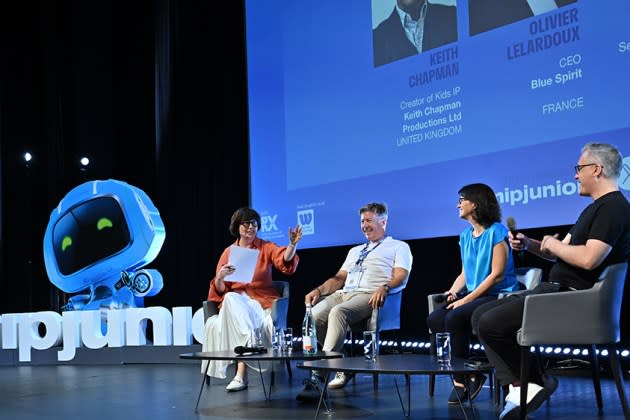MipJunior Opens as Global Kids TV Commissions Plunge, and the Industry Looks Ever More to IPs, Technology

First, the bad news. A session helping to launch an extended MipJunior on Friday afternoon, underscored just how hard the kids TV business is suffering.
Prefacing a panel discussion on the State of the Kids Entertainment Industry, Challenges & Opportunities, Ampere Analysis’ Cyrine Amor suggested global kids TV commissions were down 48% in August 2023 and down 21% year-on-year for the 12 months period to end of August 2023.
More from Variety
That’s a radically more significant decrease than the 11% decline in commissioning seen across all programs types for the same period.
U.S. SVOD services and pay TV channels are cutting back most sharply, she said. In the U.S. market, public broadcaster commissions of kids programs were down 8% through August. Pay TV commissions, in contrast, had dived 53%, SVOD orders by 33%.
“There are a lot of factors, including inflation,” she said.
Western Europe is also seeing declines, especially in public service broadcaster’s commissioning of kids TV content. That figure is down 19% percent through August.
This pressure is making Western platforms adopt trends already seen in the U.S. such as of relying more on IPs to develop properties.
While the majority of kids content in Western Europe is found on SVOD, over the last 12 months, kids programs that are the most popular were available across all platforms. Non-exclusivity can pay off for those wanting to stay popular after launch, Amor argued.
Moderator Deirdre Brennan, COO at Wildbrain, followed on the presentation grilling panelists Keith Chapman, creator of Kids IP, Keith Chapman Productions; Olivier Lelardoux, CEO of France’s Blue Spirit Studio), and Sarah Dewitt, senior VP & General Manager, PBS Kids).
Topics under discussion included changes in the industry over the last decade, instanced by the rise of digital and gaming, audience fragmentation, and the emergence of disruptive technologies such as AI.
The biggest topic was technology. “10 years ago, technology in studios was improving what you already do. Now it has a much bigger impact,” said Lelardoux. “It’s the first time in animation that technology not only disrupts animation but comes with a package of gaming.”
Technology has opened the playing field for experimentation.
“It’s time to try and fail,” he said. “It’s a new world, but we are all lost here. Of course you will fail but it’s O.K.. Little failures can lead to a big win.”
Meeting the audience, instead of following them, was another topic.
Said Dewitt: “We are always thinking about how technology allows us to find our audience. Coming out of the pandemic, kids and families like doing things together. What can they watch together?”
Technology enhances learning, she said “Kids learn more, when they have a conversation with a character that breaks the fourth wall, and asks the kids a question. Responses are written by our script writers,” she said. “Kids who are engaging like that are coming away with greater learning.”
All platforms are not equal. “Kids have different expectations for different platforms,” she said. “You can’t put the same product everywhere and expect them to respond. They do different things on different platforms.”
Added Chapman: Young entrepreneurs use technology in new ways.”
When asked where he finds inspiration, he said: “Having children helps. Watching them grow up in front of you makes you an expert in child behavior. I look for gaps and look to the future and ask what will be relevant to a kid in three to five years? Sometimes, ideas come out of nowhere. Reading. Talking. Observing kids.”
For Amor, developing a cross-media content brand is the key to the future.
MipJunior runs Oct. 13-15 in Cannes.
Best of Variety
Sign up for Variety’s Newsletter. For the latest news, follow us on Facebook, Twitter, and Instagram.

